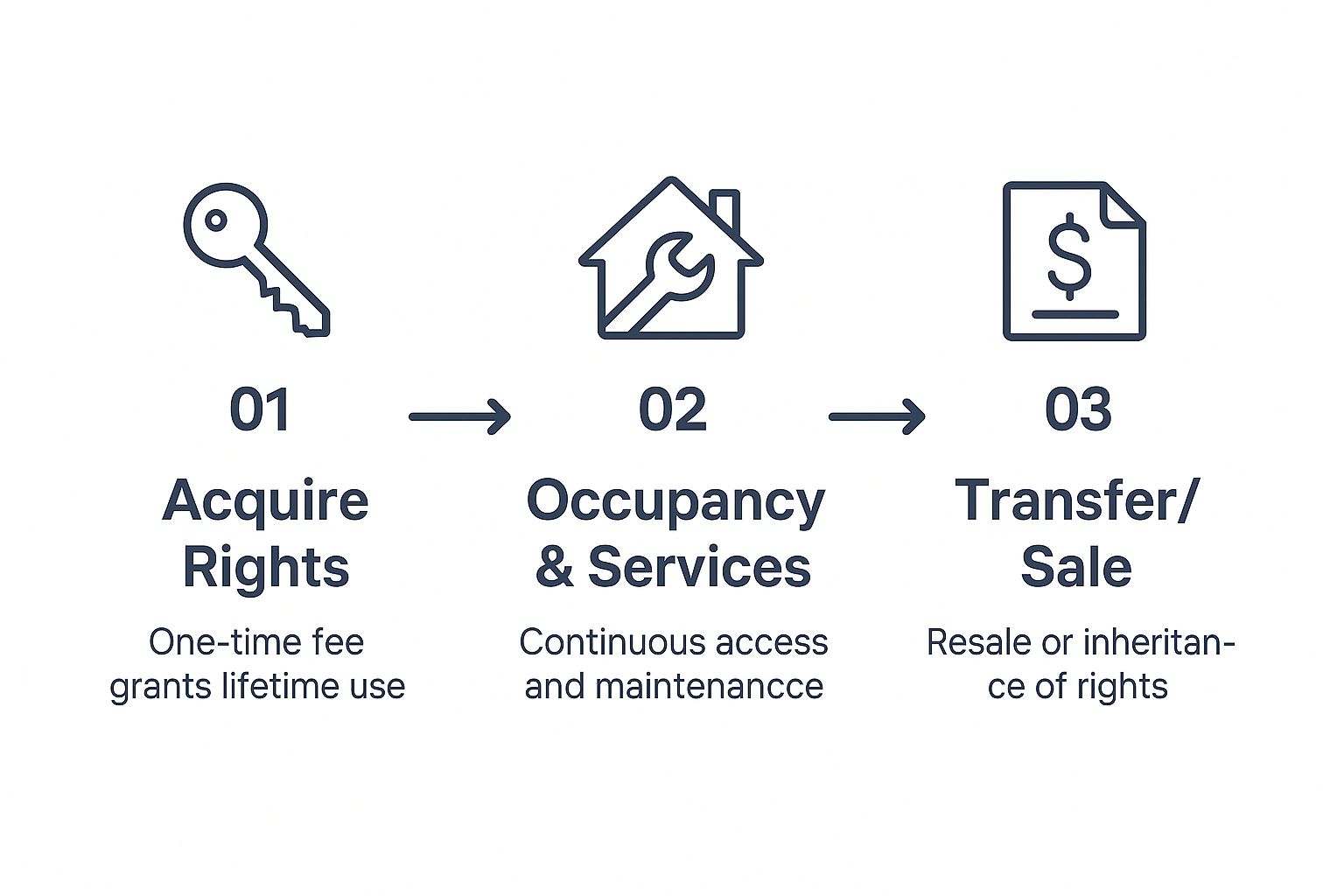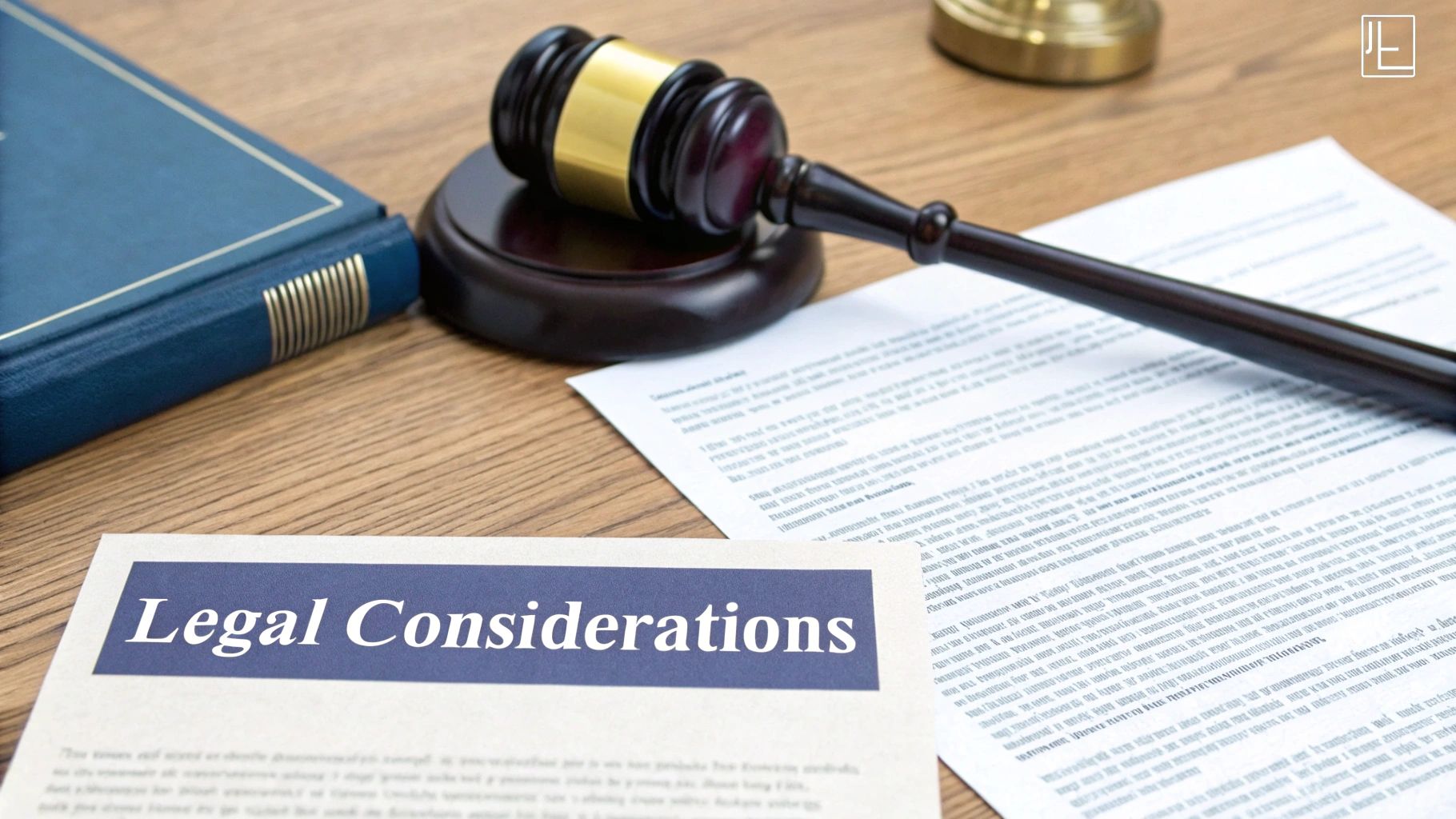Think of it this way: life rights are basically the official permission slip a filmmaker needs to tell your personal story. While a movie can be made about a public figure using only information that's already out there, getting the life rights is what gives a production team exclusive access, your direct cooperation, and—this is a big one—crucial legal protection.
Understanding Life Rights And Their Role In Storytelling

Ever watch a biopic and wonder how the filmmakers got all those intimate, behind-the-scenes details? The answer is almost always a life rights agreement. This is a formal contract between a person (the "subject") and a producer or studio, granting them the exclusive right to turn that person's life story into a film, TV show, or some other piece of media.
Here's a good way to picture it: your life is a book. Without a life rights deal, someone could write a book about you, but they’d be stuck using newspaper clippings and public records. With the deal, they get to sit down with you, read your personal diaries, and talk to your friends and family. They get to write the authorized biography. That collaboration is what takes a story from just good to truly great.
What Rights Are Actually Included?
A life rights agreement isn’t just a simple "yes, you can." It's a bundle of specific, valuable permissions that give a filmmaker a huge leg up and a layer of authenticity they couldn't get any other way.
Here’s what’s usually on the table:
- Access and Cooperation: This is the big one. The subject agrees to be interviewed, share personal materials like photos and letters, and be available for consultations.
- Exclusivity: This is key for the producer. It stops the subject from turning around and selling their story to another studio while the first project is being developed, protecting the initial investment.
- Legal Protection: The subject agrees to give up their right to sue for things like defamation or invasion of privacy, as long as the film stays within the agreed-upon creative lanes. This gives filmmakers the freedom to tell a compelling story without constantly looking over their shoulder for a lawsuit.
The real value in a life rights deal isn't just about getting the facts right. It's about securing the exclusive ability to tell a story with genuine emotional depth, pulling personal insights directly from the source.
To give you a clearer picture, let's break down what a life rights agreement means for both sides of the deal.
Life Rights at a Glance
| Concept | What It Means for the Filmmaker | What It Means for the Subject |
|---|---|---|
| The Deal | Gaining exclusive access to a person's life story and their cooperation. | Giving permission for your story to be told in exchange for compensation and some creative input. |
| The Upside | The ability to create a richer, more authentic, and legally protected film. | The chance to have your story shared, control the narrative, and get paid for it. |
| The Fine Print | The filmmaker gets creative liberty but must often adhere to certain agreed-upon facts. | You waive certain legal claims (like defamation) as long as the portrayal is fair. |
Ultimately, this arrangement is a partnership. The subject gets a voice in how their life is portrayed (and usually gets paid), while the filmmaker gets the irreplaceable material needed to build a detailed and legally sound film. It's the foundation that so many of our most memorable true-story movies are built on.
The Legal Importance of Securing Life Rights

Sure, securing life rights gets you exclusive access and the subject's personal cooperation, but the most critical reason producers chase these deals is for legal protection. Think of the agreement as a powerful shield.
It’s the best defense against career-ending, budget-draining lawsuits that can pop up when you're telling someone's real story. Without this formal contract, a filmmaker is just asking for trouble. The subject of the film—or even their family—could sue for any number of reasons, turning a passion project into a courtroom nightmare.
Averting Costly Legal Battles
The main job of a life rights agreement is to get the subject to waive their right to sue over certain claims. For any production company, this is a calculated and absolutely essential move.
A solid life rights deal helps shut down the most common legal threats, which usually include:
- Defamation: This is when you damage someone's reputation by portraying them in a false light.
- Invasion of Privacy: This claim can happen if a film reveals private facts about someone that aren't a matter of legitimate public concern.
- Misappropriation of Likeness: This protects a person's name, image, and story from being used for commercial profit without their permission.
When the subject signs on the dotted line, they are essentially giving the filmmaker permission to tell their story—even the messy and dramatic parts—without having to look over their shoulder for a legal notice. This gives the creative team the freedom they need to actually craft a compelling narrative.
At its core, a life rights agreement is a proactive legal strategy. It’s not just about getting the story; it’s about making sure you have the undisputed right to tell it. This is exactly where a skilled entertainment lawyer becomes indispensable in structuring a solid contract.
The Critical Line Between Public Figures and Private Citizens
The legal need for life rights often comes down to one huge question: is the subject a public figure or a private citizen? Trust me, this distinction is everything.
Public figures—think politicians, celebrities, and famous athletes—legally have a much lower expectation of privacy. Journalists and filmmakers have more wiggle room to report on their lives, as long as the information is based on public records and told accurately.
But the game completely changes when your story is about a private citizen. The law offers far stronger protections for regular people against having their personal lives splashed across a screen. Telling the story of an ordinary person caught in extraordinary circumstances almost always requires a life rights agreement to avoid a lawsuit for invasion of privacy.
This is why you see so many movies about unknown heroes or survivors backed by a formal life rights deal. For the filmmaker, it's not just a good idea—it's a legal necessity.
How Life Story Rights Are Acquired
So, how does a personal story actually get turned into a potential Hollywood blockbuster? It's a real journey, and it’s a lot more involved than a simple handshake deal. There's a clear roadmap with specific legal and financial steps to make sure everyone—both the person whose life it is and the producers—is protected.
The very first step is figuring out who actually holds the rights. This sounds obvious, but it can get tricky. If the person is alive, it's them. But if they've passed away, the rights typically go to their estate. That means producers find themselves negotiating with family members or legal reps.
The Power of the Option Agreement
Once you know who to talk to, the next step usually isn't an outright purchase. Instead, most producers use what’s called an option agreement.
Think of it like putting a deposit down on a house. You pay a smaller, upfront fee that gives you the exclusive right to develop the project for a set amount of time, usually 12 to 18 months. It's a way for the producer to see if the project has legs without betting the farm.
During this option period, the producer gets to work. They can hire writers, try to attach a big-name director or star, and shop the whole package around to studios to get the funding. The person whose story it is doesn't get the full purchase price just yet, but the option fee compensates them for keeping their story off the market.
An option agreement is the film industry's way of testing the waters. It gives a producer exclusive control to develop a story without having to commit to the full purchase price until they know they have a viable project.
This infographic gives you a good visual breakdown of how these rights are typically secured and managed.

As you can see, it's a clear progression from that initial fee all the way through to managing the rights, which can sometimes even include a resale.
Exercising the Option and Finalizing the Purchase
If the producer strikes gold and gets the project greenlit before the option runs out, they'll "exercise" the option. This is the big moment where the deal becomes official. Exercising the option means the producer pays the full, pre-negotiated purchase price to acquire the life rights completely.
Here's how the whole thing usually plays out, step-by-step:
- Initial Contact and Negotiation: The producer reaches out to the subject (or their estate) with their vision for the film.
- Signing the Option Agreement: Both sides agree on an option fee, an option period (say, 18 months), and the final purchase price.
- Development Period: The producer hustles to package the film by locking in talent and funding, all while the life rights are held exclusively for them.
- Exercising the Option: The producer pays the full purchase price, and the life rights are officially transferred so the film can be made.
This whole structured process is designed to protect everyone involved. The subject gets paid for their time and for giving the producer exclusive access, and the producer gets the breathing room they need to turn a powerful true story into something we can all watch on screen. It’s a methodical dance of negotiation, development, and, finally, acquisition.
Key Components of a Life Rights Agreement

A life rights agreement is much more than a simple permission slip. It’s a complex legal document, and every clause plays a role in shaping the entire project. Think of it as the blueprint for the creative partnership between the person whose life it is and the producer who wants to tell their story.
At its core, the agreement needs to spell out the scope of the rights. This is the part that specifies exactly what the producer can do with the story. Is this deal just for a movie? Or does it also cover a potential TV series, a podcast, or even a Broadway play? The more ground it covers, the more valuable the deal becomes.
This is almost always tied to exclusivity. Producers aren't just buying a story; they're investing in the story. They need exclusive rights to make sure the subject doesn't turn around and sell the same tale to a competing studio, which would completely devalue their project.
Cooperation vs. Creative Freedom
One of the stickiest points in any negotiation is the level of required cooperation. This section gets into the nitty-gritty of what the subject is expected to do. Will it be a handful of interviews, or are they agreeing to provide access to personal diaries, old photos, and introductions to family members? Getting this crystal clear from the start saves a world of headaches later on.
On the flip side, the agreement gives the producer the right to fictionalize. Let's be honest, no biopic is a 100% accurate, minute-by-minute replay of someone's life. Good storytelling demands drama. This clause gives the filmmaker the legal cover they need to invent scenes, combine characters, or tweak the timeline for dramatic effect, all without facing claims that the film isn't true to life.
The right to fictionalize is a classic tug-of-war. The subject understandably wants their story told truthfully. The filmmaker, however, needs the creative license to craft a compelling movie that audiences will actually want to see. A good agreement strikes a careful balance between respecting the truth and allowing for dramatic storytelling.
Money, Music, and More
Of course, we have to talk about compensation. It's rarely a single, flat payment. The financial structure can get pretty creative and often includes a mix of:
- Upfront Fees: This is the initial payment, whether it's an option fee to hold the rights or the full purchase price.
- Backend Profits: A percentage of the film's net profits. This gives the subject a real stake in the project's financial success.
- Consulting Fees: Separate payments for the subject's time and active participation during the development and production phases.
It’s also important to remember what a life rights deal doesn't cover. It secures the story, but other creative elements in a film are their own separate pieces of intellectual property. The musical score, for instance, is a completely different asset. If you’re curious about how that works, you can learn more about how to copyright music in our detailed guide.
These key pieces form the backbone of any solid life rights agreement, transforming a personal history into a legally sound project ready for the big screen.
Real-World Examples of Life Rights in Film
It's one thing to talk about life rights in theory, but seeing how they work on the big screen really drives the point home. The gap between a movie made with someone's blessing and one made without it can be massive. Often, it's the difference between a decent story and an unforgettable one. These deals are the secret ingredient behind some of the most powerful biopics you've ever seen.
Take the movie Erin Brockovich. Before Julia Roberts played her, the real Erin Brockovich was a regular citizen, completely unknown to the public. To tell her story right, the producers needed more than just what was in the court records—they needed her. Getting her life rights wasn't just a good idea; it was essential.
That agreement opened the door for the filmmakers to work directly with Brockovich. She shared her memories, her fiery personality, and all the little details that made her story so captivating. It’s her cooperation that let the film capture the true emotional core of her fight, turning a legal drama into a story with real human stakes. Without her life rights, the movie would’ve been missing its most important piece: Erin herself.
When Cooperation Creates Movie Magic
The real magic of a life rights deal shows up in the small, personal details you’d never find in a news article. It’s the access to private journals, old letters, and intimate family stories that makes a film feel authentic and lived-in. This is where a story finds its heart.
Think about what a filmmaker gains with cooperation:
- Authentic Dialogue: The subject can tell you how they actually talked and reacted in key moments, which adds a huge layer of realism to the script.
- Emotional Accuracy: They can give insight into what they were feeling, which helps guide an actor's performance to a more honest place.
- Exclusive Details: The story can feature private moments and inside jokes that nobody else knows, making the film truly one-of-a-kind.
This kind of collaboration is what keeps a film from feeling like a dry history lesson and turns it into a genuine portrait of a person. Working through the complexities of these agreements is a major part of what legal pros specializing in entertainment law in New York and other creative centers do every day.
A life rights deal isn't just about getting legal permission. It's about unlocking the soul of the story. It adds the texture and depth you need to really connect with an audience, making them feel like they actually know the person on screen.
The Other Side of the Coin
On the flip side, plenty of movies are made about major public figures—like presidents or famous celebrities—without securing any life rights. Legally, filmmakers are free to build a script from information in the public domain, like news reports, historical documents, and published biographies.
This approach is perfectly legal, but it often leads to a film that feels more distant and less personal. The story is built from the outside looking in, pieced together from public records instead of private truths. These films can still be great, of course, but they often miss those intimate, character-defining moments that can only come from the person who lived them. The story of Erin Brockovich just wouldn't have packed the same punch without her at the table.
When You Might Not Need to Secure Life Rights
While locking down life rights is almost always the smartest play for telling a true story, it's not always a hard legal requirement. One of the most common questions I get is whether you can make a movie about someone without their permission. The answer is a heavily qualified “yes,” particularly when you're dealing with public figures.
Thanks to the First Amendment, filmmakers have a good amount of leeway to build stories from information that’s already out in the open. Think court documents, published news articles, biographies, and historical records. If you can construct your entire narrative using only these public sources, you can often move forward without a life rights agreement.
But—and this is a big but—going down this road is risky. Even when you stick to what you think are public facts, you can still get hit with a devastating lawsuit for defamation if your portrayal is factually wrong and messes with the person's reputation. The line between creative license and outright falsehood can get very blurry, very fast.
The Trade-Offs of Going It Alone
Deciding to skip a life rights deal means you're making a huge trade-off. Sure, you get the freedom to tell the story entirely on your own terms, but you lose the one thing that can elevate a biopic from good to truly special: the subject's personal involvement.
Without their cooperation, you give up access to the good stuff:
- Private Memories: Those small, intimate details that make a character feel real and breathe on screen.
- Emotional Context: The why behind their biggest decisions and life-altering moments.
- Authentic Voice: The chance to capture the true spirit and personality of the individual you're portraying.
This lack of cooperation often leads to a film that feels speculative and distant—a story told from the outside looking in, rather than from the heart of the experience itself.
The core challenge of life rights mirrors a broader human rights issue. While legal frameworks guarantee certain protections, their practical application can be complex and fraught with gaps.
We see this gap between principle and reality even with the most fundamental right of all. For instance, despite the universal recognition of the right to life, an estimated 4.9 million children died before their fifth birthday in 2022 alone. This shows a tragic disconnect between what's guaranteed on paper and what happens in the real world. You can explore more about these global challenges and the supreme importance of the right to life in this detailed overview.
Ultimately, moving ahead without life rights means you have to be almost obsessively diligent with your research and be ready for legal battles. All the while, you have to accept that your story might be missing the very personal depth that makes the best biopics stick with us long after the credits roll.
Common Questions About Life Rights
Once you get past the basics, the world of life rights brings up a ton of practical questions. Let's face it, the real-world details are what matter most when you're trying to get a project off the ground. Here are some quick, straightforward answers to the questions I hear most often.
How Much Do Life Rights Cost?
There’s no menu pricing here. The cost can be anything from a few thousand dollars for a person no one's heard of to millions for a celebrity everyone recognizes.
A few big things move the price tag:
- How famous the person is
- The story's potential to be a box-office hit
- Whether other producers are trying to buy the same rights
Keep in mind, you usually start with an "option" fee, which is just a fraction of the total purchase price you'll pay later if the project moves forward.
Can You Make a Movie Without Permission?
Technically, yes, you can. This is especially true if your subject is a public figure and your script sticks strictly to information that's already out there in the public domain (think news articles, court records, published books).
But this path is loaded with risk. You lose out on the subject’s cooperation, which is often priceless for getting the details right. More importantly, you're leaving your production wide open to lawsuits for things like defamation or invasion of privacy if you get something wrong or reveal private facts that aren't newsworthy.
A life rights agreement is your best insurance policy against legal headaches. It’s a formal waiver from the subject, giving you the creative freedom you need while shielding your production from expensive and draining lawsuits down the road.
What Happens If the Person Is Deceased?
When the subject has passed away, their life rights don't just disappear. They typically fall under the control of their estate. That means filmmakers have to track down and negotiate with the heirs or legal representatives.
Honestly, this can be even more complicated than dealing with a living person. You might find yourself in a tricky situation with multiple family members who all have different ideas—and different agendas—about how their loved one’s story should be told.
Do Life Rights Last Forever?
Once you fully purchase the rights for your specific film or series, they generally belong to the production company forever, or "in perpetuity," as the lawyers say.
But the initial agreement to get you there—the option period—is temporary. This is the window of time you have to develop the project. It typically lasts 12-18 months, though you can often negotiate a chance to extend it.
Navigating the complexities of life rights agreements requires expert legal guidance to protect your interests. Cordero Law specializes in entertainment and intellectual property law, providing strategic counsel to ensure your story is told the right way. Learn how we can help protect your project today.
